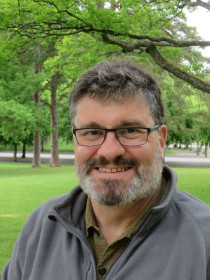Connect with Peter
About Peter
Cannavò is an environmental political theorist. His academic interests focus on how our conceptions of and relationships with the natural world, including how we organize our spatial surroundings into coherent, meaningful places, impact on our fundamental understandings of politics and community. He is currently interested in how the civic republican tradition intersects with environmentalism and in the implications of climate change for civic virtue and democracy.
Cannavò is currently Co-Chair of the Green and Social Justice Committee at May Memorial Unitarian Universalist Society in Syracuse, New York. He was previously on the Board of May Memorial. He has informally consulted on environmental issues and volunteered with Democratic congressional candidates in New York’s 24th Congressional District.
Contributions
Climate Change Presents Fundamental Challenges for Political Democracy
In the News
Publications
Traces the historical and conceptual connections between environmentalism and civic republicanism in the U.S. through the writings and politics of a series of theorists and public intellectuals, including T. Jefferson, J. Madison, H.D. Thoreau, F. Douglass, F.L. Olmsted, J. Addams, A. Leopold, J. Jacobs, M. Bookchin, W. Berry, B. McKibben, and R. Bullard.
Provides an overview of the conceptual, historical, and contemporary connections between environmentalism and the civic republican tradition.
Examines how 15 canonical political theorists conceptualized the natural world and human relations with nature. Essays on Plato, Aristotle, Machiavelli, Hobbes, Locke, Hume, Rousseau, Burke, Wollstonecraft, Mill, Marx, Du Bois, Heidegger, Arendt, and Confucius.
Argues that Hannah Arendt’s political theory emphasizes the importance of place and the centrality of a stable, coherent, meaningful geography in making the world a habitable, reliable human home.
Discusses how Henry David Thoreau, though often characterized as individualist or apolitical, is in fact an important link between Jeffersonian agrarian republicanism and environmentalism.
Discusses how Leopold avoids the pitfalls of his republican predecessors and articulates a more promising geography for civic virtue and participation. He also anticipates recent developments in environmentalism.
Looks at the evolution of the American suburban ideal from a focus on republican virtue to a consumerist orientation and considers the possibilities for a more civically engaged conception of suburbia.
Argues for a fundamental historical and conceptual connection between environmentalism and civic republicanism in the United States, with a focus on the writings of Jefferson and Thoreau and on efforts in both the green and republican traditions to connect environmental and political stability with civic virtue.
Discusses how climate change will make more and more locales marginal for human habitation and will fundamentally disrupt human place-attachments.
Analyzes how we socially and politically conceptualize and organize our spatial surroundings into coherent, meaningful places and how our land-use politics has become unnecessarily polarized between the founding and preservation of places.
